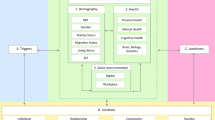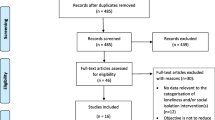Abstract
Purpose
Previous research has suggested that individuals are mostly prone to loneliness in their later years of life because of exposure to several risk factors typical of old age. The current study aims to examine possible demographic, health and social determinants of loneliness among older adults in Europe.
Methods
Data on a nationally representative sample of 5074 Europeans aged ≥ 65 years were drawn from the first wave of the Survey of Health, Aging and Retirement in Europe (SHARE, 2004/2005). Frequency of feelings of loneliness was examined according to adverse health conditions, stressful life events and social isolation indicators.
Results
Female gender, older age, lower socioeconomic status, living unpartnered, being childless and having no activity involvement were significantly associated with frequent feelings of loneliness (p < 0.001). The proportion of the respondents who declared enduring loneliness most of the time compared with none of the time was significantly higher among Southern Europeans relative to their Northern counterparts (p < 0.001). Recent departure of offspring from the parental nest was a significant predictor of loneliness in both the second (ORs = 2.08; 95% CI 1.24–3.48) and the third (ORs = 1.75; 95% CI 1.03–2.96) multiple regression models.
Conclusion
In this sample of older Europeans, several demographic characteristics, specific adverse health conditions, stressful life events and social isolation indicators were associated with feelings of loneliness. Policy initiatives for the alleviation of loneliness in older age should therefore aim at improving psychosocial and health-related difficulties faced by this population.


Similar content being viewed by others
Abbreviations
- SHARE:
-
Survey of Health, Aging and Retirement in Europe
- Euro-D:
-
European Depression Scale
- (I)ADLs:
-
Activities and Instrumental Activities of Daily Living
References
AARP (2010) Loneliness among older adults: a national survey of adults 45+. https://assets.aarp.org/rgcenter/general/loneliness_2010.pdf. Accessed 23 Oct 2017
Adams KB, Sanders S, Auth EA (2004) Loneliness and depression in independent living retirement communities: risk and resilience factors. Aging Ment Health 8(6):475–485. https://doi.org/10.1080/13607860410001725054
Allen J (2008) Older people and well-being. London Institute for Public Policy Research. https://www.ippr.org/files/images/media/files/publication/2011/05/older_people_and_wellbeing_1651.pdf. Accessed 23 Oct 2017
Bernard S (2013) Loneliness and social isolation among older people in North Yorkshire. https://www.york.ac.uk/inst/spru/research/pdf/lonely.pdf. Accessed 1 Sep 2017
Borys S, Perlman D (1985) Gender differences in loneliness. Personal Soc Psychol Bull 11:63–76. https://doi.org/10.1177/0146167285111006
Cacioppo JT, Hawkley LC (2003) Social isolation and health, with an emphasis on underlying mechanisms. Perspect Biol Med 46(3 Suppl):S39–S52
Cacioppo JT, Hawkley LC (2009) Perceived social isolation and cognition. Trends Cogn Sci 13(10):447–454. https://doi.org/10.1016/j.tics.2009.06.005S1364-6613(09)00147-8
Cacioppo JT, Hawkley LC, Crawford LE, Ernst JM, Burleson MH, Kowalewski RB, Malarkey WB, Van Cauter E, Berntson GG (2002) Loneliness and health: potential mechanisms. Psychosom Med 64(3):407–417
Cacioppo JT, Hawkley LC, Ernst JM, Burleson M, Berntson GG, Nouriani B, Spiegel D (2006) Loneliness within a nomological net: an evolutionary perspective. J Res Pers 40(6):1054–1085. https://doi.org/10.1016/j.jrp.2005.11.007
Dahlberg L, Andersson L, McKee KJ, Lennartsson C (2015) Predictors of loneliness among older women and men in Sweden: a national longitudinal study. Aging Ment Health 19(5):409–417. https://doi.org/10.1080/13607863.2014.944091
Demakakos P, Nunn S, Nazroo J (2006) Loneliness, relative deprivation and life satisfaction. In: Banks J, Breeze E, Lessof C, Nazroo J (eds) Retirement, health and relationships of the older population in England: the 2004 english longitudinal study of aging. Institute of Fiscal Studies, London, pp 297–318
Dykstra PA (2009) Older adult loneliness: myths and realities. Eur J Ageing 6(2):91–100. https://doi.org/10.1007/s10433-009-0110-3
Emerson K, Boggero I, Ostir G, Jayawardhana J (2017) Pain as a risk factor for loneliness among older adults. J Aging Health 0898264317721348. https://doi.org/10.1177/0898264317721348
Fees B, Martin P, Poon L (1999) A model of loneliness in older adults. J Gerontol B Psychol Sci Soc Sci 54(4):P231–P239
Fokkema T, De Jong Gierveld J, Dykstra PA (2012) Cross-national differences in older adult loneliness. Aust J Psychol 146(1–2):201–228. https://doi.org/10.1080/00223980.2011.631612
Gerst-Emerson K, Jayawardhana J (2015) Loneliness as a public health issue: the impact of loneliness on health care utilization among older adults. Am J Public Health 105(5):1013–1019. https://doi.org/10.2105/AJPH.2014.302427
Gierveld Jde J, Dykstra P, Schenk N (2012) Living arrangements, intergenerational support types and older adult loneliness in Eastern and Western Europe. Demogr Res 27(7):167–200. https://doi.org/10.4054/DemRes.2012.27.7
Gierveld Jde J, van Groenou MB, Hoogendoorn AW, Smit JH (2009) Quality of marriages in later life and emotional and social loneliness. J Gerontol B Psychol Sci Soc Sci 64(4):497–506. https://doi.org/10.1093/geronb/gbn043gbn043
Guerra M, Ferri C, Llibre J, Prina AM, Prince M (2015) Psychometric properties of EURO-D, a geriatric depression scale: a cross-cultural validation study. BMC Psychiatry 15:12. https://doi.org/10.1186/s12888-015-0390-4
Hall M, Havens B (2001) The effects of social isolation and loneliness on the health of older women. Research Bulletin. http://www.cwhn.ca/sites/default/files/PDF/CEWH/RB/bulletin-vol2no2EN.pdf. Accessed 23 Oct 2017
Hansen T, Slagsvold B (2016) Late-life loneliness in 11 European countries: results from the generations and gender survey. Soc Indic Res 129:445. https://doi.org/10.1007/s11205-015-1111-6
Hawkley LC, Cacioppo JT (2010) Loneliness matters: a theoretical and empirical review of consequences and mechanisms. Ann Behav Med 40(2):218–227. https://doi.org/10.1007/s12160-010-9210-8
Hawkley LC, Hughes ME, Waite LJ, Masi CM, Thisted RA, Cacioppo JT (2008) From social structural factors to perceptions of relationship quality and loneliness: the Chicago health, aging, and social relations study. J Gerontol B Psychol Sci Soc Sci 63(6):S375–S384
Holt-Lunstad J, Smith T, Baker M, Harris T, Stephenson D (2015) Loneliness and social isolation as risk factors for mortality: a meta-analytic review. Perspect Psychol Sci 10(2):227–237. https://doi.org/10.1177/1745691614568352
Jylhä M (2004) Old age and loneliness: cross-sectional and longitudinal analyses in the Tampere longitudinal study on aging. Can J Aging La Revue Canadienne du Vieillissement 23(2):157–168. https://doi.org/10.1353/cja.2004.0023
Jylhä M, Saarenheimo M (2010) Loneliness and ageing: comparative perspectives. In: Dannefer D, Phillipson C (eds) Handbook of social gerontology. Sage, London, pp 317–328
Koropeckyj-Cox T (1998) Loneliness and depression in middle and old age: are the childless more vulnerable? J Gerontol B Psychol Sci Soc Sci 53(6):S303–S312
Kuwert P, Knaevelsrud C, Pietrzak RH (2014) Loneliness among older veterans in the United States: results from the national health and resilience in veterans study. Am J Geriatr Psychiatry 22(6):564–569. https://doi.org/10.1016/j.jagp.2013.02.013S1064-7481(13)00160-7
Linardakis M, Papadaki A, Smpokos E, Micheli K, Vozikaki M, Philalithis A (2015) Association of behavioral risk factors for chronic diseases with physical and mental health in European adults aged 50 years or older, 2004-2005. Prev Chronic Dis 12:E149. https://doi.org/10.5888/pcd12.150134E149
Luhmann M, Hawkley L (2016) Age differences in loneliness from late adolescence to oldest old age. Dev Psychol 52(6):943–959. https://doi.org/10.1037/dev0000117
Masi CM, Chen HY, Hawkley LC, Cacioppo JT (2011) A meta-analysis of interventions to reduce loneliness. Personal Soc Psychol Rev 15(3):219–266. https://doi.org/10.1177/1088868310377394
Paul C (2015) Loneliness and health in later life. In: Pachana NA, Laidlaw K (eds) Oxford handbook of clinical geropsychology. Oxford University Press, Oxford, pp 381–394
Peplau L, Perlman D (1982) Perspectives on loneliness. In: Peplau LA, Perlman D (eds) Loneliness: a sourcebook of current theory, research and practice. Wiley, New York, pp 1–18
Perissinotto CM, Stijacic Cenzer I, Covinsky KE (2012) Loneliness in older persons: a predictor of functional decline and death. Arch Intern Med 172(14):1078–1083. https://doi.org/10.1001/archinternmed.2012.19931188033
Perlman D, Peplau L (1981) Toward a social psychology of loneliness. In: Gilmour R, Duck S (eds) Personal relationships 3: personal relationships in disorder. Academic, London, pp 31–56
Pinquart M (2003) Loneliness in married, widowed, divorced, and never-married older adults. J Soc Pers Relat 20(1):31–53. https://doi.org/10.1177/02654075030201002
Pinquart M, Sorensen S (2001a) Gender differences in self-concept and psychological well-being in old age: a meta-analysis. J Gerontol B Psychol Sci Soc Sci 56(4):P195–P213
Pinquart M, Sorensen S (2001b) Influences on loneliness in older adults: a meta-analysis. Basic Appl Soc Psychol 23(4):245–266. https://doi.org/10.1207/s15324834basp2304_2
Richard A, Rohrmann S, Vandeleur CL, Schmid M, Barth J, Eichholzer M (2017) Loneliness is adversely associated with physical and mental health and lifestyle factors: results from a Swiss national survey. PLoS One 12(7):e0181442. https://doi.org/10.1371/journal.pone.0181442
Russell DW, Cutrona CE, de la Mora A, Wallace RB (1997) Loneliness and nursing home admission among rural older adults. Psychol Aging 12(4):574–589
Savikko N, Routasalo P, Tilvis RS, Strandberg TE, Pitkala KH (2005) Predictors and subjective causes of loneliness in an aged population. Arch Gerontol Geriatr 41(3):223–233. https://doi.org/10.1016/j.archger.2005.03.002
Shankar A, McMunn A, Banks J, Steptoe A (2011) Loneliness, social isolation, and behavioral and biological health indicators in older adults. Health Psychol 30(4):377–385. https://doi.org/10.1037/a00228262011-08649-001
Singh A, Misra N (2009) Loneliness, depression and sociability in old age. Ind Psychiatry J 18(1):51–55. https://doi.org/10.4103/0972-6748.57861
Singh B, Kiran U (2013) Loneliness among elderly women. Int J Hum Soc Sci Invention 2(2):10–14
Steed L, Boldy D, Grenade L, Iredell H (2007) The demographics of loneliness among older people in Perth, Western Australia. Aust J Aging 26(2):81–86. https://doi.org/10.1111/j.1741-6612.2007.00221.x
Steptoe A, Owen N, Kunz-Ebrecht SR, Brydon L (2004) Loneliness and neuroendocrine, cardiovascular, and inflammatory stress responses in middle-aged men and women. Psychoneuroendocrinology 29(5):593–611. https://doi.org/10.1016/S0306-4530(03)00086-6
Theeke LA (2009) Predictors of loneliness in US adults over age sixty-five. Arch Psychiatr Nurs 23(5):387–396. https://doi.org/10.1016/j.apnu.2008.11.002
Theeke LA (2010) Sociodemographic and health-related risks for loneliness and outcome differences by loneliness status in a sample of US older adults. Res Gerontol Nurs 3(2):113–125. https://doi.org/10.3928/19404921-20091103-99
Thomas J (2015) Insights into loneliness, older people and well-being, 2015. http://webarchive.nationalarchives.gov.uk/20160106033522/http://www.ons.gov.uk/ons/dcp171766_418058.pdf. Accessed 24 Oct 2017
Tobiasz-Adamczyk B, Galas A, Zawisza K, Chatterji S, Haro JM, Ayuso-Mateos JL, Koskinen S, Leonardi M (2017) Gender-related differences in the multi-pathway effect of social determinants on quality of life in older age—the COURAGE in Europe project. Qual Life Res 26(7):1865–1878. https://doi.org/10.1007/s11136-017-1530-8
Trivedi JK, Sareen H, Dhyani M (2009) Psychological aspects of widowhood and divorce. Mens Sana Monogr 7(1):37–49. https://doi.org/10.4103/0973-1229.40648MSM-7-37
Valtorta N, Hanratty B (2012) Loneliness, isolation and the health of older adults: do we need a new research agenda? J R Soc Med 105(12):518–522. https://doi.org/10.1258/jrsm.2012.120128
van Baarsen B, Snijders TAB, Smit JH, van Duijn MAJ (2001) Lonely but not alone: emotional isolation and social isolation as two distinct dimensions of loneliness in older people. Educ Psychol Meas 61(1):119–135. https://doi.org/10.1177/00131640121971103
Victor C, Scambler S, Bond J (2009) The social world of older people: understanding loneliness and social isolation in later life (Growing Older). Maidenhead, UK
Victor C, Scambler S, Bond J, Bowling A (2000) Being alone in later life: loneliness, social isolation and living alone. Rev Clin Gerontol 10(4):407–417
Victor C, Sullivan M, Woodbridge R, Thomas M (2015) Dancing with loneliness in later life: a pilot study mapping seasonal variations. Open Psychol J 8(1):97–104
Victor CR, Bowling A (2012) A longitudinal analysis of loneliness among older people in Great Britain. Aust J Psychol 146(3):313–331. https://doi.org/10.1080/00223980.2011.609572
Victor CR, Scambler SJ, Bowling ANN, Bond J (2005) The prevalence of, and risk factors for, loneliness in later life: a survey of older people in Great Britain. Ageing Soc 25(6):357–375. https://doi.org/10.1017/s0144686x04003332
Victor CR, Yang K (2012) The prevalence of loneliness among adults: a case study of the United Kingdom. J Psychol 146(1–2):85–104. https://doi.org/10.1080/00223980.2011.613875
Wenger GC, Davies R, Shahtahmasebi S, Scott A (1996) Social isolation and loneliness in old age: review and model refinement. Ageing Soc 16(3):333–358. https://doi.org/10.1017/s0144686x00003457
Yang K, Victor C (2011) Age and loneliness in 25 European nations. Ageing Soc 31(8):1368–1388. https://doi.org/10.1017/s0144686x1000139x
Zavaleta D, Samuel K, Mills C (2014) Social isolation: a conceptual and measurement proposal. OPHI Working Paper 67, Oxford University. University of Oxford, Oxford
Author information
Authors and Affiliations
Corresponding author
Ethics declarations
Research involving human participants
ᅟ
Ethical approval
All procedures performed in studies involving human participants were in accordance with the ethical standards of the Ethics Committee of the University of Crete and with 1964 Helsinki Declaration and its later amendments or comparable ethical standards.
Informed consent
Informed consent was obtained from all individual participants included in the study.
Disclosure of potential conflicts of interest
The authors declare that they have no conflict of interest.
Rights and permissions
About this article
Cite this article
Vozikaki, M., Papadaki, A., Linardakis, M. et al. Loneliness among older European adults: results from the survey of health, aging and retirement in Europe. J Public Health (Berl.) 26, 613–624 (2018). https://doi.org/10.1007/s10389-018-0916-6
Received:
Accepted:
Published:
Issue Date:
DOI: https://doi.org/10.1007/s10389-018-0916-6




